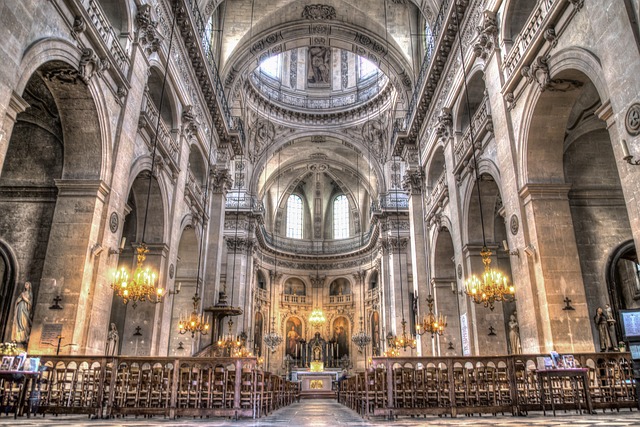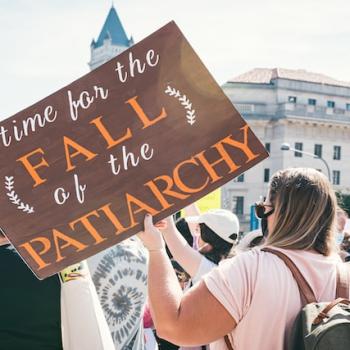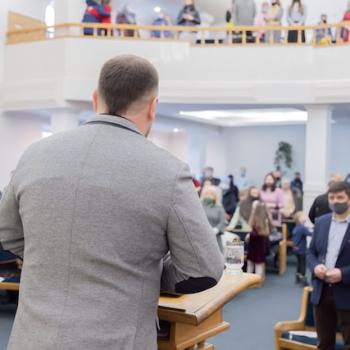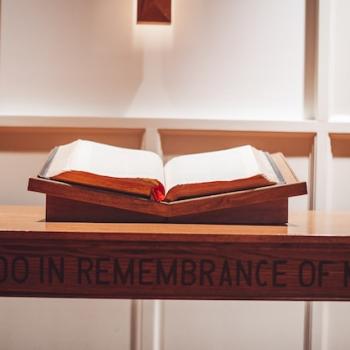I’ve been reflecting on how my views of faith and authority have changed over time. One of the questions in my (ongoing) process is this: What kind of authority does tradition have?
For some context, I spent an awful lot of my young adulthood in evangelical contexts where we basically pretended that tradition had no authority over us. We thought we were interpreting and applying the Biblical texts directly to our lives and community—no historical baggage.
No connection to Christians who came before us and who perhaps read the Bible in very different ways. No conscious association with the Catholic tradition that was the whole of Western Christianity for about three times longer than the oldest of Protestant groups have been around.
I’m skeptical, now, of this idea that we can exist in a religious universe where tradition has no power over us.
Seminary Taught Me That History Matters

For me, it took seminary to realize this. To be honest, I went into seminary thinking it would be mostly Bible classes. After all, that’s what comprised almost all of the two-year “seminary lite” program I participated in at my conservative evangelical church. I thought seminary would be more of the same.
I was surprised to learn that Bible classes were just one part of a much broader picture, including lots of theology and church history. But I think this was good for me.
These classes helped fill in the (very large and gaping) gaps between the time when the Bible was written—nearly two thousand years ago, for its most recent parts—and the ways we read it in the present day.
That’s two thousand years of history that my evangelical communities often seemed to ignore. As if it didn’t matter. As if we could just read the Bible and follow what God wants for us without understanding anything about how Christianity got to where it is.
Seminary taught me that, in reality, we are all influenced by two thousand years of tradition. Even if the tradition we’re a part of is the tradition that claims it has no tradition—which is itself a particular kind of tradition that has popped up here and there throughout history.
Authority as a Creative Conversation
What do we do, then, with this knowledge? How can we treat history as if it matters—but without letting it control us in unhealthy ways? Is there a way to let tradition inform and inspire us while also being free to think, ponder, and reinvent what doesn’t work anymore (or never worked at all)?
I appreciate womanist New Testament scholar Angela Parker’s work on this, from If God Still Breathes, Why Can’t I? Black Lives Matter and Biblical Authority (Eerdmans 2021). Parker writes:
“The English word ‘authority’ descends from the Latin word auctoritas…In Roman imperial society, auctoritas is distinct from the word ‘imperial’ (derived from imperium), which connotes the idea of rights held by government officials. In contrast, auctoritas allows for the interpretation of an elaboration upon the wisdom of those who came before. As Old Testament scholar William Brown notes, auctoritas is more creative. While precedent does matter when it comes to auctoritas, what matters more is having conversations with what comes before and after.” (pp. 26-7).
I like this idea of an ongoing conversation with what comes before and after. Precedent matters, and it’s good to be aware of it. But we are not tied to it. We can engage with it in productive, creative ways.
As Parker goes on to write, we can “[embrace] the need for an abiding sense of connection to what has happened in the past while having continued conversation with our present and imagining what future conversations could entail” (p. 27). The conversation continues. And we bring our imaginations into what faith looks like for the future.
Tradition and Authority
For those of us who spent some formative years in faith communities where tradition was presumed nonexistent, I think this idea of authority as an ongoing conversation is helpful. It pushes us in the direction of valuing tradition and history rather than ignoring it.
If there are ways we’re scared of engaging with history, perhaps this perspective helps us be less afraid. Learning more about where we come from does not mean we are stuck in these well-worn ways. It allows us to have fuller and more thoughtful conversations about who we are and who we want to be.
And for those of us, on the other hand, who grew up in communities where tradition was a little too all-powerful, I think this idea of an ongoing conversation is helpful in a different way. It frees us to converse rather than unthinkingly obey. To engage rather than submit. To expand rather than limit our imaginations.
So, then, what kind of authority does tradition have? At its best, I think, a flexible kind. A creative kind. A kind that leaves room for all of our questions and ponderings. A kind that’s open to new imaginations for the future.
This is the kind of engagement with tradition that can help our faith communities move forward in healthy ways.












